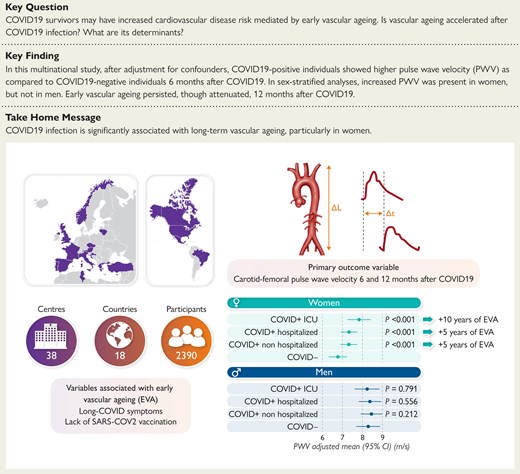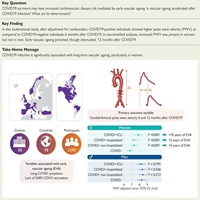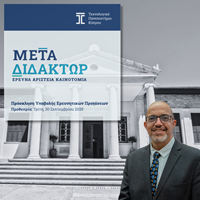A Covid infection, particularly in women, may lead to blood vessels aging around five years, according to research published in the European Heart Journal [1], with the participation of researchers from the School of Health Sciences at the Cyprus University of Technology (Lead Associate Professor Andrie Panayiotou and Dr. Galatia Photiou).
Blood vessels gradually become stiffer with age, but the new study suggests that Covid could accelerate this process. This is important since people with stiffer blood vessels face a higher risk of cardiovascular disease, including stroke and heart attack.
The study included 2,390 people from 16 different countries (Austria, Australia, Brazil, Canada, Cyprus, France, Greece, Italy, Mexico, Norway, Turkey, UK and US) who were recruited between September 2020 to February 2022. They were categorised according to whether they had never had Covid, had recent Covid but were not hospitalised, hospitalised for Covid on a general ward or hospitalised for Covid in an intensive care unit.
Researchers assessed each person’s vascular age with a device that measures how quickly a wave of blood pressure travels between the carotid artery (in the neck) and femoral arteries (in the legs), a measure called carotid-femoral pulse wave velocity (PWV), which is measured at the Cardiovascular Epidemiology and Genetics Lab (CVEG) at CUT. The higher this measurement, the stiffer the blood vessels and the higher the vascular age of a person. Measurements were taken six months after Covid infection and again after 12 months.
Researchers also recorded demographic information such as patient’s sex, age and other factors that can influence cardiovascular health. After taking these factors into consideration, researchers found that all three groups of patients who had been infected with Covid, including those with mild Covid, had stiffer arteries, compared to those who had not been infected. The effect was greater in women than in men and in people who experienced the persistent symptoms of long Covid, such as shortness of breath and fatigue.
The average increase in PWV in women who had mild Covid was 0.55 m/sec, 0.60 m/sec in women hospitalised with Covid, and 1.09 m/sec for women treated in intensive care. An increase of around 0.5 meters per second is clinically relevant and equivalent to ageing around five years, with a 3% increased risk of cardiovascular disease, in a 60-year-old woman.
People who had been vaccinated against Covid generally had arteries that were less stiff (younger) than people who were unvaccinated. Over the longer term, the vascular ageing associated with Covid infection seemed to stabilise or improve slightly.
One of the reasons for the difference between women and men could be differences in the function of the immune system. Women mount a more rapid and robust immune response, which can protect them from infection. However, this same response can also increase damage to blood vessels after the initial infection.
Vascular ageing is easy to measure and can be addressed with widely available treatments, such as lifestyle changes, blood pressure-lowering and cholesterol-lowering drugs. For people with accelerated vascular ageing, it is important to do whatever possible to reduce the risk of heart attacks and strokes.
The study is accompanied by an editorial [2] by researchers from Harvard Medical School.
The CUT research team at CVEG Lab would like to take this opportunity to thank all the volunteers who participated in the CARTESIAN-Cy arm of the study.
For more information regarding CARTESIAN-Cy you can contact Dr. Andrie Panayiotou | cveg@cut.ac.cy
https://www.facebook.com/cveglab
Links to full articles
[1] https://academic.oup.com/eurheartj/article-lookup/doi/10.1093/eurheartj/ehaf430
[2] https://academic.oup.com/eurheartj/advance-article/doi/10.1093/eurheartj/ehaf590/8236451
Αντιπρύτανης ΤΕΠΑΚ N. Τσαπατσούλης: Το Πρόγραμμα «ΜΕΤΑΔΙΔΑΚΤΩΡ» στηρίζει τους ερευνητές και ενισχύει την κουλτούρα έρευνας στην Κύπρο
A Covid infection, particularly in women, may lead to blood vessels aging around five years, according to research published in the European Heart Journal [1], with the participation of researchers from the School of Health Sciences at the Cyprus University of Technology (Lead Associate Professor Andrie Panayiotou and Dr. Galatia Photiou).
Blood vessels gradually become stiffer with age, but the new study suggests that Covid could accelerate this process. This is important since people with stiffer blood vessels face a higher risk of cardiovascular disease, including stroke and heart attack.
The study included 2,390 people from 16 different countries (Austria, Australia, Brazil, Canada, Cyprus, France, Greece, Italy, Mexico, Norway, Turkey, UK and US) who were recruited between September 2020 to February 2022. They were categorised according to whether they had never had Covid, had recent Covid but were not hospitalised, hospitalised for Covid on a general ward or hospitalised for Covid in an intensive care unit.
Researchers assessed each person’s vascular age with a device that measures how quickly a wave of blood pressure travels between the carotid artery (in the neck) and femoral arteries (in the legs), a measure called carotid-femoral pulse wave velocity (PWV), which is measured at the Cardiovascular Epidemiology and Genetics Lab (CVEG) at CUT. The higher this measurement, the stiffer the blood vessels and the higher the vascular age of a person. Measurements were taken six months after Covid infection and again after 12 months.
Researchers also recorded demographic information such as patient’s sex, age and other factors that can influence cardiovascular health. After taking these factors into consideration, researchers found that all three groups of patients who had been infected with Covid, including those with mild Covid, had stiffer arteries, compared to those who had not been infected. The effect was greater in women than in men and in people who experienced the persistent symptoms of long Covid, such as shortness of breath and fatigue.
The average increase in PWV in women who had mild Covid was 0.55 m/sec, 0.60 m/sec in women hospitalised with Covid, and 1.09 m/sec for women treated in intensive care. An increase of around 0.5 meters per second is clinically relevant and equivalent to ageing around five years, with a 3% increased risk of cardiovascular disease, in a 60-year-old woman.
People who had been vaccinated against Covid generally had arteries that were less stiff (younger) than people who were unvaccinated. Over the longer term, the vascular ageing associated with Covid infection seemed to stabilise or improve slightly.
One of the reasons for the difference between women and men could be differences in the function of the immune system. Women mount a more rapid and robust immune response, which can protect them from infection. However, this same response can also increase damage to blood vessels after the initial infection.
Vascular ageing is easy to measure and can be addressed with widely available treatments, such as lifestyle changes, blood pressure-lowering and cholesterol-lowering drugs. For people with accelerated vascular ageing, it is important to do whatever possible to reduce the risk of heart attacks and strokes.
The study is accompanied by an editorial [2] by researchers from Harvard Medical School.
The CUT research team at CVEG Lab would like to take this opportunity to thank all the volunteers who participated in the CARTESIAN-Cy arm of the study.
For more information regarding CARTESIAN-Cy you can contact Dr. Andrie Panayiotou | cveg@cut.ac.cy
https://www.facebook.com/cveglab
Links to full articles
[1] https://academic.oup.com/eurheartj/article-lookup/doi/10.1093/eurheartj/ehaf430
[2] https://academic.oup.com/eurheartj/advance-article/doi/10.1093/eurheartj/ehaf590/8236451




